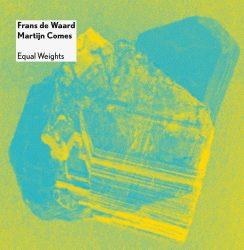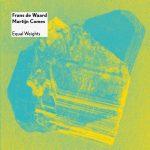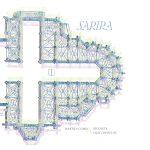FRANS DE WAARD & MARTIJN COMES – EQUAL WEIGHTS
These days, there’s nothing new about (electronic) artists working together remotely. Exchanging files back and forth, each iteration reacting on the previous. It has led to many fascinating albums of course, yet it has become a standard practice. Nothing wrong with that of course, but creative minds keep finding ways to keep that concept a step further so it stays challenging.
This online collaboration by Frans de Waard and Martijn Comes is an example of the surprising turns a different approach may take. As a start, de Waard created two empty ‘containers’ (each around 25 minutes long), adding some of his own ‘sonic brushstrokes’, but leaving it to Comes to fill the gaps. De Waard‘s electronic fragments had some kind of ‘old-school’ feeling about them, which lead to a feeling of nostalgia by Comes – thus defining the overall mood of the album. It’s interesting to note that this album is a follow-up to 2020s Various Weights, which was an example of the more classic way of interchanging sounds.
The first part of this album (‘Those Silences That Occur’) is perhaps the most surprising: there are some elements that I personally would not have expected here. The opening sequence features beautiful trumpet and fluegelhorn improvisations (by Marcel Klingeler), merging into immersive spacey electronics and then morphing into a charismatic choir loop for the second half of the first part. These ethereal sequences seem to be a recomposition from themes by Carlo Gesualdo (ca 1600) – a composer whose lifestyle did not exactly match his heavenly compositions, so to say. It is exactly this unique and unexpected combination of sounds that lifts this album to a unique level not often heard.
The second part (‘And There Is Nothing To Say’) takes off from the closing chord of the first part but quickly drifts into deeper and incrementally more abstract electronic ambiances – drifting off into infinity (and beyond) without losing the nostalgic, somewhat sentimental mood.
The CD (and download also) features a 24-page book with artwork from Bas Mantel presenting images of various kinds of gemstones ‘as a symbol for digging up objects from the past that have stayed underground for a long time.’ The booklet also features some quotes that may illustrate the struggle of creating: ‘That is not music’. ‘There is no point’, ‘There is too much of nothing in it’, ‘I am not a musician’, ‘It must be revised’, ‘That I am getting nowhere’. The constant struggle of the creative creator fighting self-doubt and uncertainty.
Uncertainty may be a necessary phase in the process of creation, but listening to the result there was no reason to doubt. This album can easily fill those silences that occur when there is nothing to say.
MARTIJN COMES & NICOLETA CHATZOPOULOU – SARIRA
Martijn Comes’ common denominator may be electroacoustic music, but he is not afraid to incorporate surprising elements into his music. Who, after all, would expect a carillon to be used as an instrument within an electronic context? Of course, the piercing sound of the bells from a carillon can by definition never be used in an ‘ambient’ context. Or can they?
Comes composed different works for this instrument: EANN in 2017, MOTHER, written for the Dom carillon in my hometown Utrecht, and Radiance, Time for carillon, tape and electronics, commissioned by the Rewire festival and performed at the Stevenskerk in Nijmegen. The first two tracks of Sarira are the recording of this Rewire performance.
Radiance, Time is split into two separate tracks: Radiance is a solo piece for carillon (performed by Malcosa Fiebig, city carillonneur of Utrecht and Nijmegen – a beautifully recorded piece of majestic bells. Time, on the other hand, ‘moulds, stretches and purifies the timbres of site-specific bell sounds into rich, cavernous reflections’. Here, the bell sounds (two bells called ‘Damiaatjes‘, from the St. Bavo church in Haarlem) sound more distant and somewhat more hesitant among their fiercely electronic surroundings.
The closing track of Sarira is a 16:31 collaboration with Nicoleta Chatzopoulou, a viola da gamba specialist, composer, and sound researcher based in Athens, Greece. Her ‘original lines and bowings remain recognizable, juxtaposed against mysterious electronic transformations, Comes’s guitar notes and the eery rattling of tuning pegs. The subtle twang of the viola, and the surprisingly rhythmical quality of the performance add up to an experience that is equally of this and another world.’
Sarira is released on The Crystal Cabinet and available as a limited ‘tea shell’ cassette (edition of 30), and of course as a digital download.





Pingback: Frans de Waard & Martijn Comes - Equal Weights - Moving Furniture Records